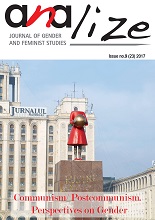Yugoslav Communism: Gender and Power Discourses in the Constituent Republics (From Communism to Feminism: What Does It Take?)
Yugoslav Communism: Gender and Power Discourses in the Constituent Republics (From Communism to Feminism: What Does It Take?)
Author(s): Veronika TomovaSubject(s): Gender Studies, Political history, History of Communism
Published by: Societatea de Analize Feministe AnA
Keywords: Communism; Yugoslavia; women’s representation in power; gender discourse;
Summary/Abstract: The mass participation of women in the communist-led Yugoslav Partisan resistance is one of the most remarkable phenomena of the Second World War, which unprecedented and elsewhere unrivaled female military involvement of more than two million women joining the Partisan movement has inflicted change in the gender norms and values installing the Yugoslav Communism. The female transition from the medical corps to the Partisan forefront combats not only created the new model of warfare, but also laid the foundations of the gender (semi)inclusive communist leadership of the Partisan State, where though the Women’s Antifascist Front of Yugoslavia, the political, economic and social realms, have become the new battlefields for equality between the genders. Although constitutionally defined as a “Federal Republic of equal nations and nationalities freely united in achieving specific and common interests, where all social actors, each according to ability and needs, are contributing to the realization of the human rights and freedoms with respect to human dignity” (as stated in the Constituent Acts of Yugoslavia and Constitution of SFRY, 1974), women in the Yugoslav system were well represented in comparison with the representation of women in other communist or noncommunist countries at the time (prior to the first-wave of the feminist movement), but yet, underrepresented in comparison with their participation in the National Liberation Movement. Instead of being celebrated, the merit of women in all aspects of the anti-fascist resistance, after winning the battlefield of the Second World War was disregarded, which has put them in another battlefield for equality between the genders. Considering the extent of the struggle, conclusions can be drawn that the fight against the fascist aggressor was easier than the fight against the patriarchal one. In that regard, through an analytical, qualitative, quantitative and comparative approach, this article aspires to answer the question of if and how the Yugoslav Communism has affected the gender and power discourses in the former Communist Federal and today’s Democratic Sovereign Republics.
Journal: AnALize: Revista de studii feministe
- Issue Year: 2017
- Issue No: 9 (23)
- Page Range: 70-86
- Page Count: 17
- Language: English

